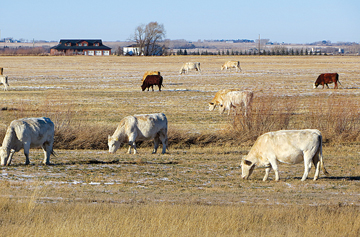Current Temperature
5.9°C
Cattle industry decimated by heat wave
Posted on July 23, 2021 by 40 Mile Commentator Commentator/Courier Commentator File Photo
Commentator/Courier Commentator File Photo
By Justin Seward
Commentator/Courier
The resilient heat wave Alberta has been experiencing for the last number of weeks has taken its toll on the cattle industry.
Alberta Beef Producers chair, Melanie Wowyk, said the main issues are that the province has not had high temperatures for such a long time period time, the lack of moisture and the often-windy conditions.
“So, what that did, is it just decimated crops and pasture extremely quickly,” said Wowyk.
“We had some moisture at the beginning of the summer—it set up the crops pretty good and the pastures pretty good. I think even if we just had a lack of moisture we might have been OK. But those high temperatures—I can’t think of another word but decimated.”
The cattle industry is now running out of pasture.
“We’re trying to get these cows through to the fall,” she said.
“But then we’ve got to decide how we’re going to feed them. And there’s no hay around, hay prices have just gone through the roof. Now only is Alberta affected, but also all the western provinces, western Ontario (is) also affected and a large portion of the United States.”
Alberta Beef Producers have heard there have been a lot of American hay buyers tapping into southern Alberta and buying off those producers that are able grow hay through irrigation.
“It’s just creating a lot of competition for feed and there isn’t much out there,” said Wowyk.
“We’re trying to line up to get crop producers with their crops that won’t be viable to allow us to either go in and bail them or graze them. But there’s been some issues there as well because they have contracted their grain. Those grain contractors do not want to let the cattle have that feed. They are wanting to try and salvage any crop that they have.”
ABP has been in touch with the government since the end of June.
“We saw that it started to get kind of dry then,” said Wowyk.
“We spoke to the northern and the central caucuses about that. And then once we started to see that conditions really started to go fast downhill, we have been in touch with AFSC (Agriculture Financial Service Corporation). What we have managed to do is get 121 more crop assessors out in the province to allow for some pre-harvest assessment of these crops and anything that is written off and is available for cattle feed.”
ABP pushed hard to get the federal and provincial governments on board and now have some agriculture recovery on the way.
A webinar was the held with the Beef Cattle Research Council this week to assist producers with their watering.
“I mean the watering thing is difficult,” she said.
“If you don’t have a river or water sources around, these dugouts are drying up pretty quickly as well and there’s always the potential there for these high temperatures, (for) issues with the water—like blue-green algae or they could be too high in sodium.”
The ABP is attempting to get the government to initiate a livestock tax deferral.
“So, that people that have to liquidate part or all of their herd can then come back into the industry when things improve,” said Wowyk.
“We’re also trying to extend that past a year so that guys have a little bit more than a year to work things out.”
She thinks a decision that may be looming in the cattle industry is how many producers will come back if large amounts of the herd are liquidated.
Leave a Reply
You must be logged in to post a comment.

